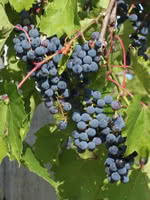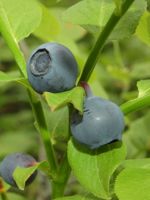Mon-Fri 9am - 5pm Mountain time
Frontenac Grape vs Bilberry
Vitis x Frontenac
Vaccinium myrtillus
NOT AVAILABLE THIS SEASON - MIGHT RETURN
CUSTOM GROW
Frontenac Grape is a prairie hardy climbing vine that produces juicy, flavorful grapes. Expect aromas of cherry, plum, and berry from the wine and juice you make from this grape.
Note: if you want grapes for fresh eating, you might want to look at Brianna or Valiant Grape.
This vine requires a fence or trellis to encourage upward and outward growth. Consistent pruning and maintenance is necessary to reliably produce fruit, which usually occurs between 3 and 4 years of age.
Note: We do not ship grape vines to BC due to regulatory restrictions from the Canadian Food Inspection Agency.
Bilberry is a native perennial shrub valued for its small, blue-black berries that ripen in mid to late summer. The berries resemble blueberries but have a richer, more tart, and intense flavor. They have long been used for fresh eating, baking, and preserves, while also providing food for birds and mammals. In spring, its delicate pinkish flowers attract bees and other pollinators.
Growing low to the ground, Bilberry forms spreading colonies that create dense understory cover. This growth habit provides food and shelter for wildlife, and its foliage adds seasonal interest by turning red to purple in autumn. With its adaptability and ecological benefits, Bilberry is well-suited for naturalization, ecological restoration, and pollinator gardens.
Frontenac Grape Quick Facts
Bilberry Quick Facts
Toxicity: leaves may be unsafe in high doses

